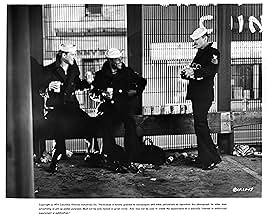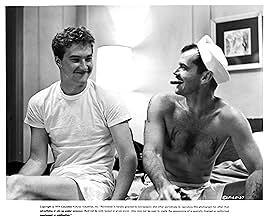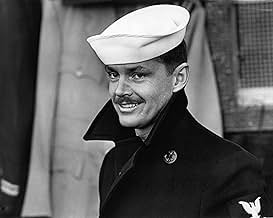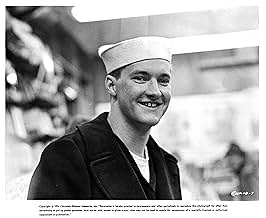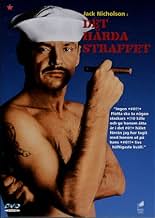NOTE IMDb
7,5/10
30 k
MA NOTE
Deux hommes de la Marine reçoivent l'ordre d'emmener un jeune délinquant en prison, mais ils décident de lui faire passer un dernier bon moment en cours de route.Deux hommes de la Marine reçoivent l'ordre d'emmener un jeune délinquant en prison, mais ils décident de lui faire passer un dernier bon moment en cours de route.Deux hommes de la Marine reçoivent l'ordre d'emmener un jeune délinquant en prison, mais ils décident de lui faire passer un dernier bon moment en cours de route.
- Réalisation
- Scénario
- Casting principal
- Nommé pour 3 Oscars
- 6 victoires et 9 nominations au total
Patricia Hamilton
- Madame
- (as Pat Hamilton)
Avis à la une
Though the film's storyline diverges from the more existential theme of the Darryl Ponicsan novel from which it was adapted, 'The Last Detail' was, is, and remains the only real deal film about navy enlisted men. Hollywood never did sailors so well as it does them here.
If you don't care for testosterone-impelled behavior, parochial esprit de corps, scatology, and profanity - well, never mind: the dialogue here is true-to-life sailorese, and the hi- and low-jinks antics are too. If you can't take the heat, get the hell out of the galley.
Gritty cinematography of the earthy, low-rent world of enlisted sailors (for example, watching the "decent peoples' world" pass by the filth-streaked windows of a worn, smelly railway car) communicates much of the characters' experience of life in the margins and their ethos and how they came by them. The Johnny Mandel score is often oddly, and too-cheerfully irrelevant, though one suspects its breezy take on nautical marches and ditties was meant to be satirical; but it's often discordant with the serious themes - 'the individual versus society', existential choice and haplessness - of 'The Last Detail'.
In a role that could have been tailor-made for him Jack Nicholson's acting is perhaps the best of his career - a superior foreshadowing of his later turn in 'One Flew Over the Cuckoo's Nest'. But without Otis Young as his fellow seasoned petty officer and Randy Quaid as the naive young, brig-bound seaman, Nicholson's tour de force would have fallen as flat as a flathat (for all you landlubbers: the navy blue "Donald Duck" US NAVY-ribbon bound winter sailors' hats, which sailors hated intensely, that were abolished in the early 60's).
Politically correct left-leaning folks should discover in Gunners Mate 1st Class "Mule" Mulhall a perfect example of an African American professional sailor: serious yet fun-loving; jocular but no-nonsense; competent and quietly self-assured: in short, a sailor among sailors, a man among men. I know because I served, and when the chips were up or down no sailor cared about color, and each of us cared only that he or she could rely, or not, on our shipmates. Though it has its arcane rules, written and unwritten, the naval service is remarkably egalitarian in opportunity - and it is so without all the hue and cry of civilian "social consciousness".
Though it's a marvel of a film, 'The Last Detail' could not cram into its running time all the humor and pathos of the eponymous, tough-tender Ponicsan novel (in which petty officer Mulhall's character looms quite a bit larger than he does in the movie, and Billy Buddusky's reflexive resorting to signalling with his Signalman's semaphoring hands spells out apt clues to his worldview); and the novel (which, incidentally, I read while on active duty, before the film had been made) turns out with a dramatically different ending - with a true denouement absent from the screenplay's conclusion that left me wanting, and which is the film's only grave, if quibbling, flaw. But the screenplay incorporates characters, scenes (Carol Kane as the careworn young whore providing Quaid's Seaman Meadows his first experience of coupling), and dialogue that might also have helped the novel to better flesh out and plumb the characters and their experience. Small matter, really: the book and the film contrast and complement each other perfectly.
Anyone considering enlistment should see 'The Last Detail' because it tells enlisted sailors' life like it is. If you can take life like it is, with or without the occasional fix ('An Officer and a Gentleman' anyone?) of kitschy, unrealizable romantic fantasy, then 'The Last Detail' is your meat.
The Real Deal. Chow Call, Chow Call - All hands lay to the messdeck! Take all you want - Eat all you take. Down to 'The Last Detail'.
If you don't care for testosterone-impelled behavior, parochial esprit de corps, scatology, and profanity - well, never mind: the dialogue here is true-to-life sailorese, and the hi- and low-jinks antics are too. If you can't take the heat, get the hell out of the galley.
Gritty cinematography of the earthy, low-rent world of enlisted sailors (for example, watching the "decent peoples' world" pass by the filth-streaked windows of a worn, smelly railway car) communicates much of the characters' experience of life in the margins and their ethos and how they came by them. The Johnny Mandel score is often oddly, and too-cheerfully irrelevant, though one suspects its breezy take on nautical marches and ditties was meant to be satirical; but it's often discordant with the serious themes - 'the individual versus society', existential choice and haplessness - of 'The Last Detail'.
In a role that could have been tailor-made for him Jack Nicholson's acting is perhaps the best of his career - a superior foreshadowing of his later turn in 'One Flew Over the Cuckoo's Nest'. But without Otis Young as his fellow seasoned petty officer and Randy Quaid as the naive young, brig-bound seaman, Nicholson's tour de force would have fallen as flat as a flathat (for all you landlubbers: the navy blue "Donald Duck" US NAVY-ribbon bound winter sailors' hats, which sailors hated intensely, that were abolished in the early 60's).
Politically correct left-leaning folks should discover in Gunners Mate 1st Class "Mule" Mulhall a perfect example of an African American professional sailor: serious yet fun-loving; jocular but no-nonsense; competent and quietly self-assured: in short, a sailor among sailors, a man among men. I know because I served, and when the chips were up or down no sailor cared about color, and each of us cared only that he or she could rely, or not, on our shipmates. Though it has its arcane rules, written and unwritten, the naval service is remarkably egalitarian in opportunity - and it is so without all the hue and cry of civilian "social consciousness".
Though it's a marvel of a film, 'The Last Detail' could not cram into its running time all the humor and pathos of the eponymous, tough-tender Ponicsan novel (in which petty officer Mulhall's character looms quite a bit larger than he does in the movie, and Billy Buddusky's reflexive resorting to signalling with his Signalman's semaphoring hands spells out apt clues to his worldview); and the novel (which, incidentally, I read while on active duty, before the film had been made) turns out with a dramatically different ending - with a true denouement absent from the screenplay's conclusion that left me wanting, and which is the film's only grave, if quibbling, flaw. But the screenplay incorporates characters, scenes (Carol Kane as the careworn young whore providing Quaid's Seaman Meadows his first experience of coupling), and dialogue that might also have helped the novel to better flesh out and plumb the characters and their experience. Small matter, really: the book and the film contrast and complement each other perfectly.
Anyone considering enlistment should see 'The Last Detail' because it tells enlisted sailors' life like it is. If you can take life like it is, with or without the occasional fix ('An Officer and a Gentleman' anyone?) of kitschy, unrealizable romantic fantasy, then 'The Last Detail' is your meat.
The Real Deal. Chow Call, Chow Call - All hands lay to the messdeck! Take all you want - Eat all you take. Down to 'The Last Detail'.
The Last Detail by Hal Ashby is much like John Schlesinger's Midnight Cowboy in that they are both road trip movies as well as buddy movies. They are about friendships that forged in extreme circumstances and the effect that these experiences have on each character's lives.
In the last detail, an unfortunate seaman by the name of Meadows (Randy Quaid) is condemned to jail for eight years for a misdemeanor crime he was unable to even complete. Being caught with his hand in the cookie jar after a mere forty dollars, he is consequently transported from a naval base in the south to the naval prison in Portsmouth, Maine. The last detail of a few veteran naval officers, namely Billy "Bad Ass" Buddusky (Jack Nicholson) and "Mule" Mulhall (Otis Young) is to transport this eighteen year old, soon to be prisoner up the east coast.
The three gentlemen have never met before and all seem to have different interests. Billy and Mule are after some welcomed time off from the suffocating life on the naval base, while Meadows is drowning in his own depression. Billy is more of a lenient presence, while Mule seems to want to do his duty first and then relax. Soon the men form a bond. This bond and their relationship is what carry the movie. Meadows is an innocent and modest teenager who found his way into the navy because of a shop lifting problem. However, after hearing his story and spending time with the boy, the two officers realize the ludicrous charges that have been brought against such an undeserving soldier.
They take pity on him and decide to make his last days of freedom ones in which he will cross every right of passage yet to be undiscovered and make them days that he will never forget. As they gradually open up to each other, they grant the prisoner a certain degree of freedom beginning with the removal of the cuffs in the beginning of the movie. They get him drunk in Washington, D.C., involve him in his first fist fight in New York City and help him lose his virginity in Boston. Beyond these rights of passage, the officers also relate to the emotional side of Meadows. They allow him to visit his mother. What the two officers did not realize is that the journey they would take would be reciprocal. They all end up taking their guard down.
One of the more poignant lines in the film is when Meadows refers to the officers as his beast friends. Although he has only known them for less than a week, the sad fact is that these men are probably the closest friends that he has ever had. Mule and Billy have had much more life experience and are well versed in the details and idiosyncrasies that life involves. They connect with meadows because before this trip, he had been yet untouched by the worse side of life. His general doe eyed demeanor drives home the fact that he really does not deserve the treatment that he's receiving. Upon leaving the prison, I don't believe that Mule and Billy are so much angry with the way the ascending officer treated them as they are with the situation that Meadows is now faced with. "We could have prevented this.
In the last detail, an unfortunate seaman by the name of Meadows (Randy Quaid) is condemned to jail for eight years for a misdemeanor crime he was unable to even complete. Being caught with his hand in the cookie jar after a mere forty dollars, he is consequently transported from a naval base in the south to the naval prison in Portsmouth, Maine. The last detail of a few veteran naval officers, namely Billy "Bad Ass" Buddusky (Jack Nicholson) and "Mule" Mulhall (Otis Young) is to transport this eighteen year old, soon to be prisoner up the east coast.
The three gentlemen have never met before and all seem to have different interests. Billy and Mule are after some welcomed time off from the suffocating life on the naval base, while Meadows is drowning in his own depression. Billy is more of a lenient presence, while Mule seems to want to do his duty first and then relax. Soon the men form a bond. This bond and their relationship is what carry the movie. Meadows is an innocent and modest teenager who found his way into the navy because of a shop lifting problem. However, after hearing his story and spending time with the boy, the two officers realize the ludicrous charges that have been brought against such an undeserving soldier.
They take pity on him and decide to make his last days of freedom ones in which he will cross every right of passage yet to be undiscovered and make them days that he will never forget. As they gradually open up to each other, they grant the prisoner a certain degree of freedom beginning with the removal of the cuffs in the beginning of the movie. They get him drunk in Washington, D.C., involve him in his first fist fight in New York City and help him lose his virginity in Boston. Beyond these rights of passage, the officers also relate to the emotional side of Meadows. They allow him to visit his mother. What the two officers did not realize is that the journey they would take would be reciprocal. They all end up taking their guard down.
One of the more poignant lines in the film is when Meadows refers to the officers as his beast friends. Although he has only known them for less than a week, the sad fact is that these men are probably the closest friends that he has ever had. Mule and Billy have had much more life experience and are well versed in the details and idiosyncrasies that life involves. They connect with meadows because before this trip, he had been yet untouched by the worse side of life. His general doe eyed demeanor drives home the fact that he really does not deserve the treatment that he's receiving. Upon leaving the prison, I don't believe that Mule and Billy are so much angry with the way the ascending officer treated them as they are with the situation that Meadows is now faced with. "We could have prevented this.
Nicholson's "Bad Ass" is a beautifully crafted piece of character. He cusses. He fights. He drinks. He's loud. No one else speaks Robert Towne's words better than Nicholson. In this film he overwhelms at every turn. In the bar scene, he shows brute anger and a desire for dominance. The scenes with a young Nancy Allen are delightfully witty because of Nicholson's schoolboy antics of getting a woman into bed.
It is the scenes with Randy Quaid (also wonderful) where Nicholson shines brightest. "Bad Ass" represents a paternal figure lacking in Meadows' life. He makes him a man by demanding he send back a hamburger if it's not cooked the way he likes it. He demands Meadows to stop crying and be a man. He demands Meadows to stand up for himself and fight when someone pushes his buttons. He demands Meadows to want to have sex, like other men his age. Nicholson's father figure image here is played off perfectly as Meadows sort of imitates things "Bad Ass" does. If Bad Ass has a beer, Meadows has a beer. If Bad Ass wants a woman, Meadows wants a woman. There's a secret trust between the two. It's unspoken, but it's there. That trust is broken in the end when Meadows tries to escape. It wasn't all a lie, Meadows just felt that it was time to stop learning and start moving.
It is the scenes with Randy Quaid (also wonderful) where Nicholson shines brightest. "Bad Ass" represents a paternal figure lacking in Meadows' life. He makes him a man by demanding he send back a hamburger if it's not cooked the way he likes it. He demands Meadows to stop crying and be a man. He demands Meadows to stand up for himself and fight when someone pushes his buttons. He demands Meadows to want to have sex, like other men his age. Nicholson's father figure image here is played off perfectly as Meadows sort of imitates things "Bad Ass" does. If Bad Ass has a beer, Meadows has a beer. If Bad Ass wants a woman, Meadows wants a woman. There's a secret trust between the two. It's unspoken, but it's there. That trust is broken in the end when Meadows tries to escape. It wasn't all a lie, Meadows just felt that it was time to stop learning and start moving.
I read somebody's comment that this film isn't "deep." I think that viewer missed a whole layer of the story. you have to keep in mind that this was written and produced during the vietnam war and released during the early months of Watergate.
The story is about these two working class sailors, who are completely disenfranchised, just "doing their job." They're good guys but in the end, don't lift a finger to stop a massive injustice. They don't even take the time to think about it, because they feel there's nothing they can do about it. They pay lip services to how wrong things are about the situation, but in the end they do what "the man" says and they're just as much to blame for the problem as the commanding officers above them.
Through the course of the film, the sailors meet a lot of "chatting class" folks who are mad at Nixon and discussing politics, and they meet Hari Krishnas who are chanting to change things, but nobody is really taking any ACTION. Everyone is pissed off at the injustice of the world but nobody does anything about it. It's about inaction. And that inaction slowly boils up in the main characters and turns into anger that brings the film to a sad end. (It's one of those great stories that gets you pissed off at the injustice in the world...)
Having said all that, on a more tangible level, the performances and scripting are full of emotion and Nicholson's and Quaid's performance are amazing and hilarious to watch. But this isn't really a comedy in the end...more tragic really (with some good laughs along the way).
Check it out!
The story is about these two working class sailors, who are completely disenfranchised, just "doing their job." They're good guys but in the end, don't lift a finger to stop a massive injustice. They don't even take the time to think about it, because they feel there's nothing they can do about it. They pay lip services to how wrong things are about the situation, but in the end they do what "the man" says and they're just as much to blame for the problem as the commanding officers above them.
Through the course of the film, the sailors meet a lot of "chatting class" folks who are mad at Nixon and discussing politics, and they meet Hari Krishnas who are chanting to change things, but nobody is really taking any ACTION. Everyone is pissed off at the injustice of the world but nobody does anything about it. It's about inaction. And that inaction slowly boils up in the main characters and turns into anger that brings the film to a sad end. (It's one of those great stories that gets you pissed off at the injustice in the world...)
Having said all that, on a more tangible level, the performances and scripting are full of emotion and Nicholson's and Quaid's performance are amazing and hilarious to watch. But this isn't really a comedy in the end...more tragic really (with some good laughs along the way).
Check it out!
Ever since 9/11, you hear a lot of fluff in the press about our "heroes" in the armed services. Typically they are portrayed as wide-eyed, short hair enthusiasm and commitment machines. It's a nice image, but the real version is much more human, much more interesting and much more likable.
I was a naval officer for seven years. The best part of my service was the wonderful opportunity to get to know the many men and women who make up the enlisted ranks of our armed services. They tend to be from the rural towns of the south and Midwest or the inner city ghettos. Most of them were average students with limited financial prospects. The ones who succeed in the ranks enough to stay for 20 years do so because the Navy is the first place where they belong. And because they enjoy the job. They get good at it and they believe that what they are doing is much more rewarding and challenging than their friends back home.
They also love to party. To drink and to chase skirts and raise hell. They feel entitled to and they are almost always out for a good time without hurting anyone. They also love to mentor the younger sailors to show them how to survive and how to enjoy the time in.
The details of this movie are wonderful. The dreary time in transit, ironing uniforms and staring at the walls. Wanting to be at sea, something that few people can imagine until they've done it. The thrill of a few days per diem to blow in bars. The resignation of being a lifer and above all the nature of Navy friendships.
Jack Nicholson's character and Otis Young's are not natural friends. They probably wouldn't have time for one another in any other line of work, but having the shared experience of being First Class Petty Officers at the same base is enough for them to be comfortable with one another and to enjoy each other's company. They also both take to the young kid and they both know how to treat him because they've been doing it for so long.
I can't tell you how real these characters were to me. I can's say "Oh Jack reminds me of GSM1 So-and-so and Otis reminds me of QM1 Whatshisname". IT's too real for that. They both remind me of many, many people I had the good fortune to work with.
And they are flawed. They lack the guts to spare Randy Quad from this injustice. They don't even stick together on the way back to Norfolk, probably because they know they did something less than wonderful to the young man. They are indoctrinated but not inhuman.
I also enjoyed seeing shades of Jack's work in "One Flew Over the Cukoo's Nest". Bad-ass is kind of a rough draft of his McMuphy. This is Jack at his finest.
Randy Quaid's performance made me feel a little bit sad. Not just for the character, but for the actor. He had so much talent back then and somehow he got pigeon holed playing big dopes. He certainly has as much talent as his younger brother but not the leading man looks. I don't think I'll ever see him in the Vaction movies without cringing. He should have become so much more. (Of course his other work is entertaining but it's never touching or through provoking as it is here.) And Otis Young was terrific too. I'm not sure why he never got more good roles, but this is something to be proud of.
In short, this is the most realistic navy movie I've ever seen. If you're thinking about enlisting, or if a loved one is, this is not a bad way to see what the navy does to a man-good and bad. And it's funny that they do this without ever setting foot on a vessel.
I want to find the poster and hang it on my walls next to my commission.
I was a naval officer for seven years. The best part of my service was the wonderful opportunity to get to know the many men and women who make up the enlisted ranks of our armed services. They tend to be from the rural towns of the south and Midwest or the inner city ghettos. Most of them were average students with limited financial prospects. The ones who succeed in the ranks enough to stay for 20 years do so because the Navy is the first place where they belong. And because they enjoy the job. They get good at it and they believe that what they are doing is much more rewarding and challenging than their friends back home.
They also love to party. To drink and to chase skirts and raise hell. They feel entitled to and they are almost always out for a good time without hurting anyone. They also love to mentor the younger sailors to show them how to survive and how to enjoy the time in.
The details of this movie are wonderful. The dreary time in transit, ironing uniforms and staring at the walls. Wanting to be at sea, something that few people can imagine until they've done it. The thrill of a few days per diem to blow in bars. The resignation of being a lifer and above all the nature of Navy friendships.
Jack Nicholson's character and Otis Young's are not natural friends. They probably wouldn't have time for one another in any other line of work, but having the shared experience of being First Class Petty Officers at the same base is enough for them to be comfortable with one another and to enjoy each other's company. They also both take to the young kid and they both know how to treat him because they've been doing it for so long.
I can't tell you how real these characters were to me. I can's say "Oh Jack reminds me of GSM1 So-and-so and Otis reminds me of QM1 Whatshisname". IT's too real for that. They both remind me of many, many people I had the good fortune to work with.
And they are flawed. They lack the guts to spare Randy Quad from this injustice. They don't even stick together on the way back to Norfolk, probably because they know they did something less than wonderful to the young man. They are indoctrinated but not inhuman.
I also enjoyed seeing shades of Jack's work in "One Flew Over the Cukoo's Nest". Bad-ass is kind of a rough draft of his McMuphy. This is Jack at his finest.
Randy Quaid's performance made me feel a little bit sad. Not just for the character, but for the actor. He had so much talent back then and somehow he got pigeon holed playing big dopes. He certainly has as much talent as his younger brother but not the leading man looks. I don't think I'll ever see him in the Vaction movies without cringing. He should have become so much more. (Of course his other work is entertaining but it's never touching or through provoking as it is here.) And Otis Young was terrific too. I'm not sure why he never got more good roles, but this is something to be proud of.
In short, this is the most realistic navy movie I've ever seen. If you're thinking about enlisting, or if a loved one is, this is not a bad way to see what the navy does to a man-good and bad. And it's funny that they do this without ever setting foot on a vessel.
I want to find the poster and hang it on my walls next to my commission.
Le saviez-vous
- AnecdotesThe script was completed in 1970 but contained too much profanity to be shot as written. Columbia Pictures waited for two years trying to get writer Robert Towne to tone down the language. Instead, by 1972, the standards for foul language relaxed so much that all the profanity was left in.
- GaffesThe MAA Master Chief is not wearing a Master-at-Arms rating badge; he is wearing a Boatswain mate rating badge.
The Master At Arms rating was disestablished in 1921, but was officially re-established on 1 August 1973. Therefore, as the story takes place, a Master Chief Boatswain's Mate being assigned the collateral duty of MAA is entirely accurate.
- Bandes originalesNever Let The Left Hand Know
by Jack Goga
Meilleurs choix
Connectez-vous pour évaluer et suivre la liste de favoris afin de recevoir des recommandations personnalisées
- How long is The Last Detail?Alimenté par Alexa
Détails
- Date de sortie
- Pays d’origine
- Sites officiels
- Langue
- Aussi connu sous le nom de
- El último deber
- Lieux de tournage
- Sociétés de production
- Voir plus de crédits d'entreprise sur IMDbPro
Box-office
- Budget
- 2 300 000 $US (estimé)
Contribuer à cette page
Suggérer une modification ou ajouter du contenu manquant



